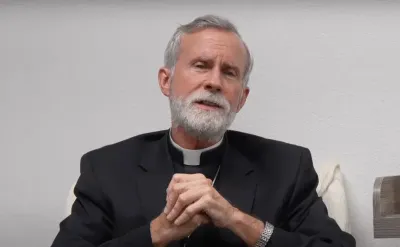Pope Leo XIV could make a profound contribution to moral civic life and true spiritual progress by developing his own version of 'Rerum Novarum.'
(Fr. Michael P. Orsi) — Mark Twain has often been credited with the aphorism: “History doesn’t repeat itself, but it rhymes.”
Whether Twain actually said that is unclear (there are other possible authors), but the observation is accurate. Different eras often do see similar challenges.
The accession of Cardinal Robert Francis Prevost to the Throne of St. Peter and his selection of the papal name Leo XIV set obvious parallels between this new pontificate and the reign of his namesake, Leo XIII.
The earlier Leo served as Vicar of Christ from 1878 to 1903. This was the height of a period of economic and technological change which history has come to call the Industrial Revolution.
Manufacturing replaced agriculture as the main pursuit of various peoples around the world, with consequent population shifts from rural areas to cities. This prompted certain problematic situations which the Church needed to examine.
Business was increasingly consolidated in large corporations, creating huge disparities of wealth and political influence. Workers often found themselves toiling in unsafe conditions, underpaid and exploited, their families living in cramped, unhealthy tenement housing. A growing labor movement created widespread economic disruption, sometimes instigated by Communists, and often turning violent.
Leo addressed these circumstances with his famous encyclical “Rerum novarum” (of revolutionary change), known in English as “Rights and Duties of Capital and Labor.” This historic document has provided the moral and philosophical basis of Catholic social teaching ever since.
Our new Leo takes up his duties during another period of extreme change, the so-called Digital Revolution. Gaining in sophistication over the past decade, Artificial Intelligence has emerged as the driving force in electronic technology.
This quantum leap in computing power promises to be as transformative as the movement from handicrafts to machines in the 19th century — with as much uncertainty about the effects on all our lives. It’s likely that whole new industries will come into being. It’s already certain that existing technologies will be altered or superseded entirely.
Social disruptions are to be expected, as the economy and labor market adjust in response to these increasingly rapid technical advancements. We just don’t know what forms the adjustments will take.
That’s where our new Pope comes in.
READ: Vatican says AI generated fake video of Pope Leo XIV praising Burkina Faso president
The Chicago-born pontiff has already signaled his awareness of the human and ethical implications of A.I. Speaking at a recent conference in Rome, he harkened back to his predecessor, Leo XIII, who while living in “an age of momentous and disruptive change, sought to promote peace by encouraging social dialogue between capital and labor, technology and human intelligence, and different political cultures and nations.”
In attempting to navigate today’s changing technological scene, our new Pope cautioned that the Church must train people in “critical thinking,” in order to cut through the “shouting [which] often replaces it, not infrequently in the form of fake news and irrational arguments proposed by a few loud voices.”
Only in this way, he said, can we achieve the “deeper reflection” necessary to understand the times we live in, put the Church’s social doctrine into practice effectively, and meet pressing human needs.
What specific proposals he will put forth remain to be seen. But some areas of consideration are obvious:
- Dignity of the human person must be our first concern. The high-tech sector has long demonstrated a tendency to place technical wizardry over user service (a prime illustration is the ongoing decline in customer support). We must reverse the penchant for making people bend to the heartless demands of systems. Human beings are more important than devices.
- Similarly, we must find ways to help workers who are displaced by Artificial Intelligence or robotics retrain for each new wave of advancements. On a larger scale, businesspeople and civic officials must take steps to assure that whole communities aren’t gutted by technological changes that make established industrial practices obsolete, thus destroying major employers. In all, compassion must come before technology or at least keep pace with it.
- We must reemphasize the importance of facts, honesty and human judgement. Artificial Intelligence is an invaluable aid in processing large volumes of information quickly, in recognizing patterns, trends, relationships and similarities to strengthen decision-making. But it cannot make moral judgments or replace the acquired wisdom gained through lived experience. Responsibility and leadership must remain firmly in human hands.
- We must keep emphasis on human contact and shared communication. Artificial Intelligence is proving useful as a tool of scholarship and creative expression. But it lacks a human heart, and it cannot address the spiritual side of our nature. We’ve seen the divisive aspect of technology for a while now. Family members sitting around the dinner table each looking at their own iPhone has become a cliché of our time. We must not allow A.I. to impose even more barriers to personal interaction and distract us from the reality that’s right before us.
Pope Leo XIV could make a profound contribution to moral civic life and true spiritual progress by developing his own version of “Rerum Novarum,” an encyclical or major statement that addresses the challenges of technology. In particular, he should explore the ethical application of Artificial Intelligence for the betterment of human life and the service of God.
Rev. Michael P. Orsi is senior advisor to Action for Life Florida and host of “A Conversation with Father Orsi,” a weekly television series that delves into current events with a focus on sanctity of life issues. His writings appear in numerous publications and online journals. His TV show episodes can be viewed online here.
Published with permission from Fr. Orsi.

